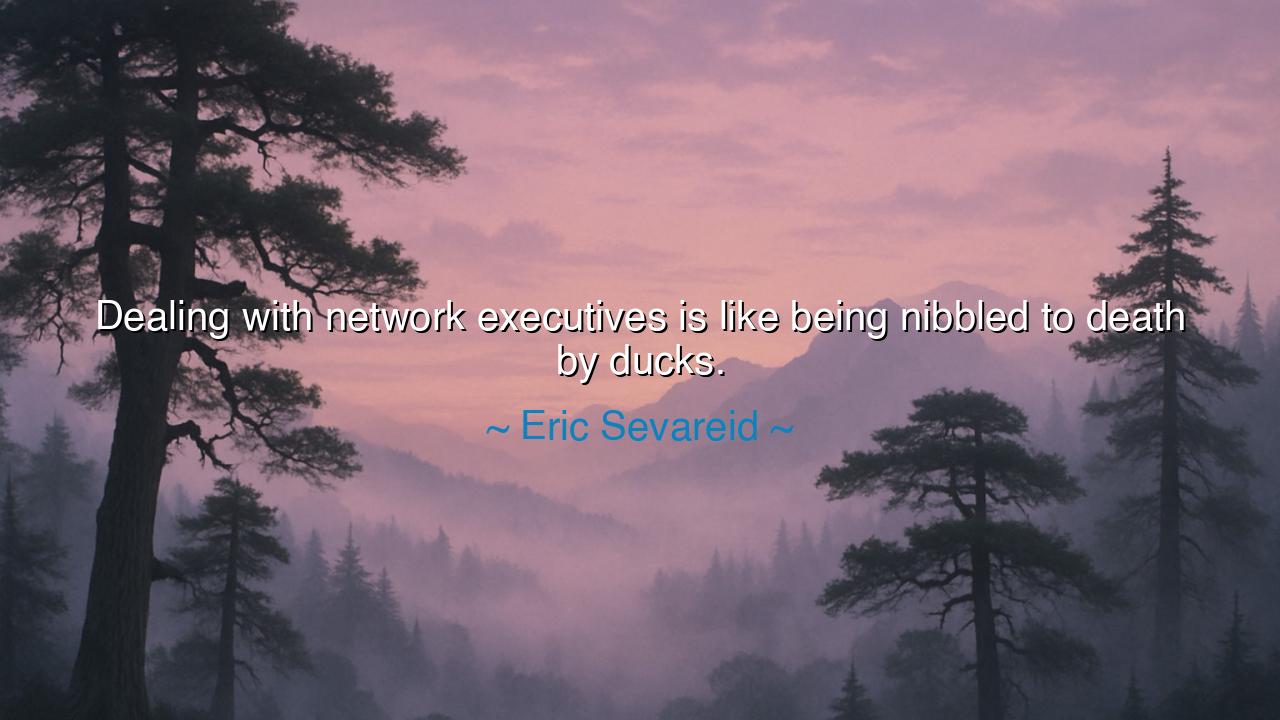
Dealing with network executives is like being nibbled to death by






The journalist Eric Sevareid once said, “Dealing with network executives is like being nibbled to death by ducks.”
At first, these words seem laced with humor — a wry observation from a man who had spent a lifetime navigating the turbulent waters of broadcasting. Yet beneath the wit lies a truth as ancient as human endeavor itself: that great ideas are rarely destroyed in a single blow; more often, they are worn down by a thousand small interferences. Sevareid, a war correspondent and one of the most eloquent voices in twentieth-century journalism, understood the slow agony of vision besieged by bureaucracy. His quote, though born of the modern age, carries the timeless warning that even the smallest forces, if persistent enough, can erode greatness.
The origin of this saying lies in Sevareid’s long career in American television, particularly during his years at CBS. As a journalist of deep intellect and moral conviction, he often found himself at odds with the cautious, profit-driven tendencies of the corporate managers — the network executives — who oversaw the programs. These were not villains, but men and women of fear — fearful of controversy, of losing sponsors, of shaking the comfortable order. Their constant meddling, their endless edits and memos, were not daggers, but pecks — small, incessant acts that left the creative spirit weary. Thus, Sevareid likened the experience to being nibbled to death by ducks — not slain by lions, but slowly worn away by creatures too small to be fatal, yet too numerous to ignore.
This image — the death by a thousand nibbles — has echoed through all ages of labor and art. In the courts of kings, the thinkers and poets were often bound by cautious advisors who softened their words to please power. In the world of invention, men like Galileo and Tesla endured endless skepticism and interference from those who could not see beyond their own limited understanding. It is rarely the sword that halts progress; it is the swarm of small minds who, with timid hands, trim the wings of genius so that it may never truly fly. Sevareid’s ducks are the timeless symbol of pettiness and fear, which together form the invisible chains that bind the spirit of creation.
Yet, there is more to his metaphor than lamentation. The duck is not fierce; it is ordinary. Its power lies not in strength, but in persistence. And so it is with bureaucracy, with criticism, with the thousand small demands that life imposes upon the dreamer. The ancients would have recognized this truth. Marcus Aurelius, the philosopher-king, wrote of men who “buzz about like flies, yet sting with their ignorance.” He counseled patience and endurance, urging that one should not be broken by such irritations, but rather rise above them. In this way, Sevareid’s ducks are not only the adversaries of creativity — they are the tests of character and resolve.
Consider the story of Winston Churchill, who, during his career, faced not grand assassins but endless critics, doubters, and bureaucrats who sought to restrain his vision. Before he became the leader who would guide Britain through war, he was dismissed, mocked, and sidelined by those who found him too outspoken, too unmanageable. He endured years of “duck bites” — small humiliations that could have worn down a lesser man. Yet he persisted, holding firm to his conviction until the storm came and the world finally saw the strength that lay beneath his stubbornness. Like Sevareid, he understood that to lead, to create, to think freely, is to accept the pain of constant interference — and yet to keep going.
The wisdom of Sevareid’s remark lies not only in its humor, but in its call to resilience. Every artist, every leader, every creator will face their own flock of ducks — the slow pecking of small doubts, distractions, and critics. Rarely will destruction come from a single mighty foe. Instead, it will come from the endless small hands that ask you to change, to compromise, to dilute your truth for the sake of comfort. The wise must learn to endure these nibbles without losing the will to create. For to stop moving, to give in to the irritation, is to die the slow death of the complacent.
So, my child of purpose, take heed of Sevareid’s wisdom. Guard your vision as one guards a flame from the wind — not with anger, but with steadiness. Do not waste your strength swatting at every duck that circles you; rise above them, focused and unwavering. Simplify your purpose, keep your mind calm, and remember that the greatness of your work is not measured by how free it is from interference, but by how steadfastly it shines despite it.
And when you feel the thousand small pecks of doubt, bureaucracy, and fear upon your spirit, remember this ancient truth wrapped in Sevareid’s modern wit: greatness is not undone by the mighty, but by the meddling — unless the heart remains unyielding. So endure the ducks, ignore their noise, and continue your work. For in the end, those who keep their focus amid a storm of small distractions shall carve their name into eternity.






AAdministratorAdministrator
Welcome, honored guests. Please leave a comment, we will respond soon